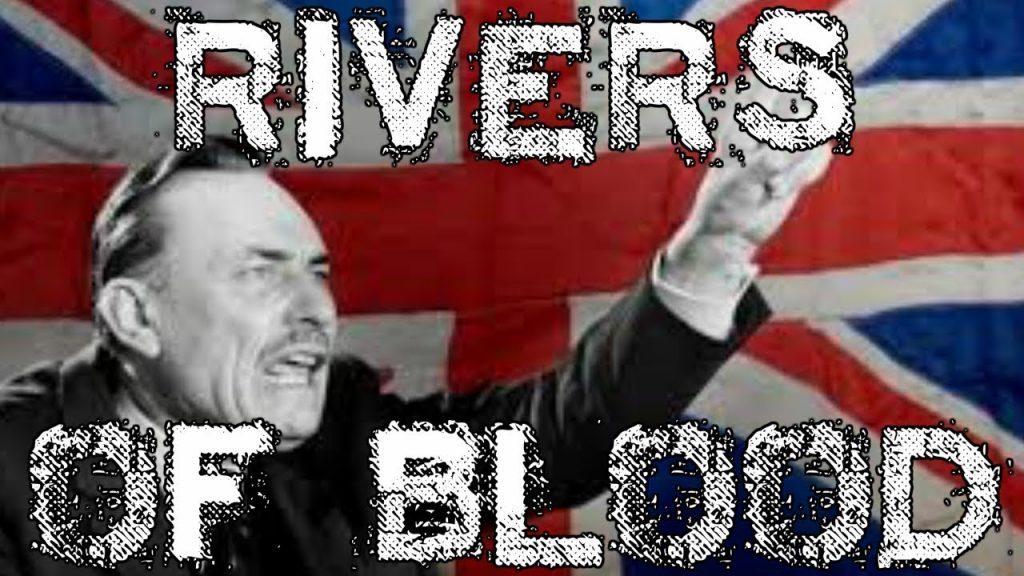
Are the Rivers of Blood flowing again?
by Maeve Carroll
1968. My mum was three years old, her father an Indian immigrant from Uganda and her mother a French immigrant with a strong accent and a faltered grasp of the English language. Coincidentally, that was the year that Enoch Powell made his ‘Rivers of Blood’ speech. Inciting racial hatred and encouraging discrimination, the atmosphere was unsettling. My mum grew up in a world where racial slurs were shouted at her as she left her house, but that was acceptable because these opinions were validated by the conservative cabinet in power at the time. She was not welcome or safe in her own country. Brexit heartbreakingly echoes similar sentiments, with Nigel Farage citing Powell as a “political hero” (the Economist), with religious and racial hate crimes surging by 23% post-referendum (The Independent), there is a call for truthful, conducive discussion on the consequences of immigration. Throughout this post I will examine the impact that migration has had on society with focus on the issue of race.

Nigel Farage, anti-immigration rhetoric during the Brexit-campaign
The topic of immigration is often used as a ‘scape-goat’ by politicians and the tabloids, almost as a distraction attempt so the real issues behind the faults in our society are not discussed and thus not resolved. At the time of the census only 8.3% of the UK population were not born in this country. This number is minimal and you would assume the impact would be too, but the campaign against immigrants has been so successful, everyone is aware of it being some sort of issue. The Brexit campaign was genius, managing to accumulate a widespread energy surrounding politics. For two years that was all anyone could speak about, the side you were on defined you. The word hate is on everyone’s tongue. You either hate what the opposition stands for or you are with them in the hate they promote. One of the biggest concerns is that the influx of immigrants reduces wages and job opportunities for native Britons due to more competition. Contrary to this fear, the increased population creates more demand for goods and services. EU immigrants pay more in taxes than they take from public services, helping to reduce the budget deficit. Migration has existed from the beginning of time. It is human nature to migrate to an area that provides necessary resources, we are just very lucky to be living in a country of stability, where it is hard to imagine what it feels like to have to abandon your home for fear of the safety of your children.
Between 1995 and 2015, the number of immigrants from other European Union (EU) countries living in the UK tripled from 0.9 million to 3.3 million. (CEP) The influx came after the ‘A8’ East European countries joined the EU in 2004. As Fox outlined in his paper, the discussion on East European migration highlights the institutional racism still present in our country. Although they are white and “whiteness is a shared currency” (Fox 2012) their culture is ‘other’ therefore ‘threatens’ the sovereignty of the british culture. During the 80’s signs in the pubs read ‘No dogs, No Blacks, No Irish’, immigrants were not welcome regardless of their race, their culture was different and unacceptable to the society. It is important to question whether the ‘issue’ of race affects how social policy is created or if it in itself is a byproduct of existing social policy. Enoch Powell called for the legislation against discrimination to be abandoned as it would “blind this country to the rising peril” (The Telegraph). Strong, emotive, fear mongering language was used to mobilise a group that had in, recent years, been controlled and minimised, with the exact same outcome arising from the referendum. Ken Clarke a Tory MP addressed this issue in the house of commons claiming that the Conservative party had become ‘mildly anti-immigrant’ (Business Insider) which I would say was an understatement as they attempt to gain the support from the far-right demographic of society. However by beginning discourse on the issue, we can attempt to publicise the issue before we reach the same state of dissolution that existed in the 1980’s.
One of the most notable issues here is that the tabloid culture of clickbait leads to an abandonment of truth. It promotes this idea of ‘evil’, the issues are no longer about people, we are numbers in a system, a mythical entity to blame. We are moving towards a worrying lack of humanity. Powell discussed the idea of repatriation, sending people back to their ‘own country’. I’ve had people shout that at my mum whilst I’ve been walking down the street with her. But the common reply is where? We live in an ever-increasing globalised world, our communities are diverse and so is our culture. An integrated, diverse society will ultimately lead to growth, as experiences and culture are shared, so is knowledge.
Offline references
Jon E Fox, Laura Moroşanu, Eszter Szilassy The Racialization of the New European Migration to the UK Vol 46, Issue 4, 2012

0 Comments